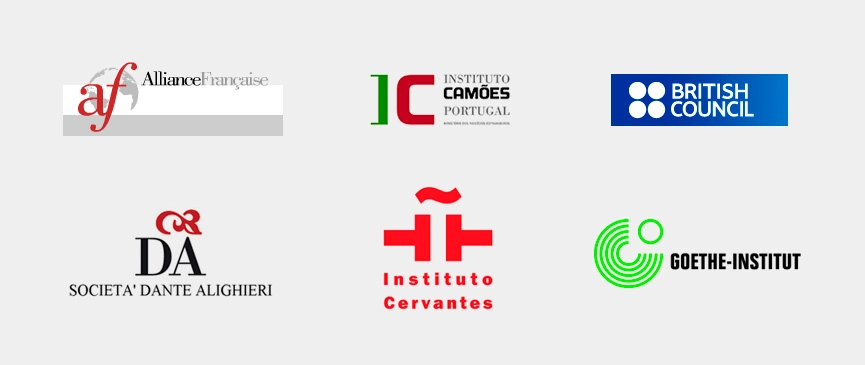Main content
Alliance Française, Società Dante Alighieri, British Council, Goethe Institut, Instituto Cervantes and Instituto Camões Prince of Asturias Award for Communication and Humanities 2005

Alliance Française (France), Società Dante Alighieri (Italy), British Council (United Kingdom), Goethe Institut (Germany), Instituto Cervantes (Spain) and Instituto Camões (Portugal).
Founded in 1884, the Alliance Française has been pursuing its ambitious project of spreading the French language and its culture worldwide for over a century. Such important people as Louis Pasteur, Ernest Renan, Julio Verne and Armand Colin figure amongst the Alliance's directors. Its main center is in Paris. Its first European centre was opened in Barcelona. It now boasts centres in 136 countries across the five continents. It opened the first foreign cultural centre to be sanctioned by the Chinese government in Pekin in October 2004. As a pioneer in teaching French as a foreign language, the Alliance launched teaching methodologies that take into account local languages and education systems. Cultural activities round off a wide-ranging programme of conferences, exhibitions, artistic creations and other activities designed to disseminate the idea of a country that is open to dialogue between cultures.
Launched in 1889 by a group of intellectuals, the Società Dante Alighieri extended its scope to cover Italian outposts in Africa and America after the First World War. The Society's commissions worked alongside missionaries to instil life into schools and other centres for the dissemination of Italian cultures amongst emigrants and their offspring. In the aftermath of the Second World War, its libraries abroad were updated, reading of Dante was fostered in Italy and closer collaboration with Italian cultural associations abroad was forged. New statutes were drawn up in 1960, providing the Società with a single rationale: to protect and defend the Italian language and its culture throughout the world. With over one hundred thousand students, the organisation is located in 60 countries and manages almost 3,300 schools and institutes.
Launched in 1934, the British Council opened its first office abroad in El Cairo four years later. At the time, the organisation was seen as an international body to promote the values of parliamentary democracy in the face of the threat of Fascism. It now has 220 offices in a range of cities in 110 countries throughout the world, with 600,000 students and a staff of 7,000. One million people per year choose to sit for its official qualifications in English. Its libraries boast 250,000 members, and 8.5 million visitors pass through its information services every year. Fostering British education and training, working alongside governments and NGOs and disseminating innovation, creativity and excellence in British sciences, arts, literature and design all figure amongst its main objectives. One of the Institute's greatest landmark events was to organise a British art exhibition for the public in Teheran (Iran) for the first time ever, as also was working with opposition groups and other civilian organisations in the final years of apartheid in South Africa.
Founded in 1951, the Goethe Institut is Germany's most important cultural institution. With a network of 144 institutes and centres in 78 countries, cultural societies, reading libraries, examination and German language teaching centres, the Institute has played a key role in cultural and educational policies abroad for the fast five decades. Its Department for Culture offers a wide variety of topics in such fields as literature, philosophy, cinema and the audiovisual media, the plastic arts, architecture and design, music, and dance and theatre, placing particular emphasis on the latest trends and on dialogue between creators and promoters of culture in the different countries that it works in. The Goethe Institut faces the political and cultural challenges of globalisation by proposing the use of mutual understanding to develop innovative concepts for a more humane world in which cultural variety is acknowledged as a form of wealth and enrichment.
Established in 1991 to promote and teach the Spanish language and to disseminate Spanish and Latin American culture, the Instituto Cervantes boasts 58 centres around the world, 1.240 teachers and more than 1,600 class hours per day in a range of countries throughout Europe, Asia, America and Africa. Supporting the work of hispanists, launching activities to disseminate culture in collaboration with other Spanish and Latin American organisations and with organisations from the host country, and providing public libraries with state-of-the-art technologies all figure amongst its main objectives. Apart from its Institutes, it also has a sister organisation called the Aula Cervantes, which consists of resource centres for self-access Spanish studies in universities and other centres in countries such as Bulgaria, Hungary, Vietnam and Croatia.
The Instituto Camões took over from the Institute of Portuguese Culture and Language in 1992 to strengthen the guidance, coordination and implementation of Portugal's cultural policies abroad, and in particular to disseminate Portuguese. It has offices in Berlin, Brussels and Vigo, as well as 28 Portuguese language centres and 15 cultural centres in 21 countries. It also organises activities in as many as 84 countries in Africa. America, Asia and Europe, besides having a teaching network in study centres in universities in the five continents, departments, university chairs, institutes and associations.
End of main content
